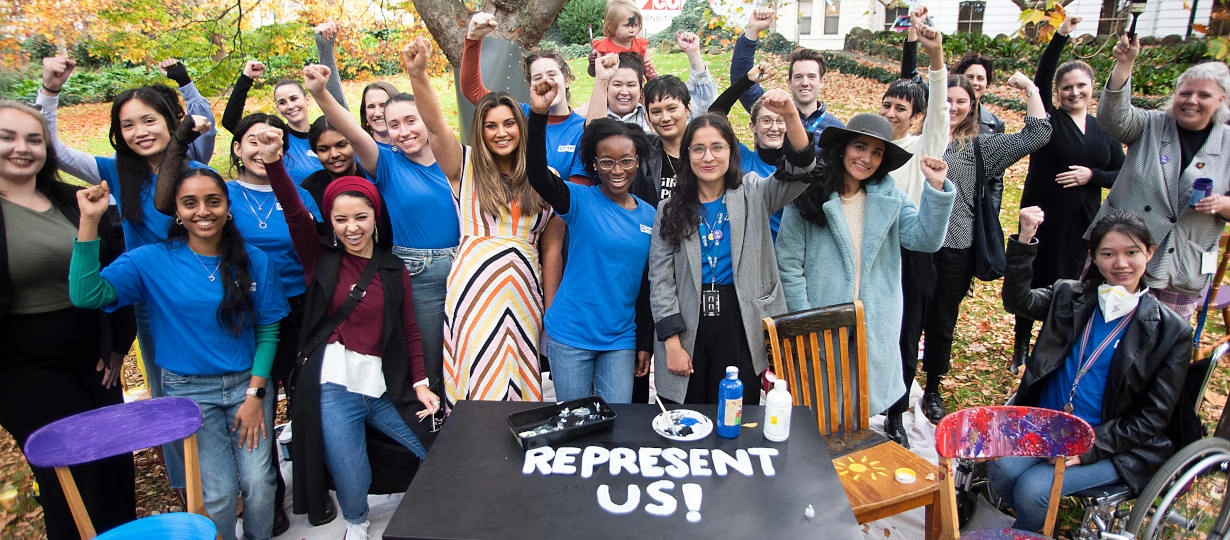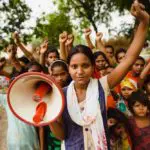Media Centre - Media release - 21 November 2022
“This is what democracy look like”: youth converge on Canberra with a plan for better political representation for young people

A cohort of almost 50 young people from some of Australia’s largest youth focused organisations have embarked on a mission to Parliament this week to meet senior ministers and leaders with a bold new plan to ensure youth engagement in politics.
Starting today, these inspiring young change-makers will meet with a range of political heavy hitters to make the case for some serious changes around representation, political engagement and breaking down the barriers so that young people feel included and respected to participate in politics.
Youth activists and ambassadors from Plan International Australia, UNICEF, Raise Our Voices Australia, Oaktree, and AYAC will hold individual meetings and roundtable discussions with MPs and Senators from across the political spectrum, including Ministers and Shadow Ministers.
These meetings coincide with groundbreaking new research by Plan International, released today, outlining how political spaces could be transformed to become truly inclusive and representative for young people in Australia and South East Asia.
Throughout the week, more than 80 parliamentarians including Foreign Affairs Minister Penny Wong, leader of the Nationals David Littleproud, Greens senators Sarah Hanson-Young, Lidia Thorpe, Adam Bandt, Senate Leader of the Opposition Simon Birmingham, Coalition MP Bridget Archer, Minister for Youth Amanda Rishworth, and Minister for Finance Katy Gallagher will deliver 90-second speeches in Parliament House, written by young people in their electorate.
The speeches, which have been organised by Raise our Voices Australia as part of its Youth Voices in Parliament campaign, aim to amplify the voices of young people and their visions for the future.
Raise Our Voice Australia founder Ashleigh Streeter-Jones – who was listed on the Forbes 30 Under 30 Asia list in 2020, and was a guest speaker at former Prime Minister Julia Gillard’s sold-out Not Now, Not Ever events in October – said a lot of young people in Australia were unsure about how to create change and were under-represented in politics.
“We know that people turn away from spaces in which they don’t see themselves represented and all of the organisations and young people coming together today are really, really keen to change this,” said Ms Streeter-Jones.
“It’s critical that we continue to elevate the voices of young Australians in our political process – after all, they’re not just the leaders of tomorrow, they’re also the architects of today,” she said.
New youth-led research from Australia and South-East Asia maps out what inclusive, and truly representative, civic spaces could look like for youth
Released today, the Voices for Change report saw a group of inspiring youth activists from Australia, Vietnam and Indonesia co-design a research project to uncover how young people in their diversity engage in politics in the Asia Pacific region, and the changes they want to see when it comes to decisions directly affecting their lives. It follows Plan International’s Equal Power Now research, a global survey of 29,000 girls and young women that found that girls, young women and gender-diverse people are incredibly motivated to engage in politics, yet feel excluded from politics, particularly in Australia.
“Every single day, young people are fighting for their right to be heard – and they’re dissatisfied with decision makers not listening to them due to their age, gender, ethnicity, disability, or sexuality. Based on our key findings in Australia, they feel disempowered due to the lack of transparency and accountability within government. Despite this, they are still passionate about working towards the common goal of diversity, inclusion and equality,” says Jan Sam, one of the Australian researchers and activists.
Voices for Change found a number of hurdles to young people engaging with politics in Australia, Indonesia and Vietnam. The biggest barriers the young people identified included:
- Young people do not feel represented
There are very few young politicians and even though the last election saw the most diverse Australian Parliament elected yet, there is a still a long way to go to ensure young women, girls and gender diverse young people in their diversity see themselves represented. Young people do not feel represented or visible in Australia’s political sphere, with the same sentiment is echoed in Vietnam and Indonesia. According to Plan International Australia data, while the number of women in the House of Representatives has increased from 25% in 2012 to 38% in 2022, based on current progress, it will take another decade for equal representation for women in the House.
- Young people do not feel safe
Over the past couple of years in the Australian parliament, alleged sexual assaults, bullying and intimidation have reinforced for women and gender-diverse people that parliament is not a safe place for them. In fact, 30% of young women surveyed from culturally and linguistically diverse communities said they would never consider a career in politics due to their cultural or ethnic background.
- Young people do not trust politicians
In Australia and Indonesia, one of the most common challenges identified was young people’s distrust of conventional politics and traditional institutions of governance. They feel that youth organisations and young people are not properly consulted when drafting laws and policy development.
Showing politicians another way
This November, the youth activists have the ear of some of Canberra’s most powerful politicians. They are meeting with all parties and they have a plan to help Australia’s youth be heard. The youth activists’ plan includes:
- Invest in, support and work with grassroots, youth-led networks or “youth councils”
The fight for gender and climate justice is being led by young women, girls and gender diverse young people. Particularly in Australia, First Nations young women are at the forefront of social change and equality. Young people are calling for the Australian Government to support and work with grassroots youth-led networks, particularly those working with and for young women and gender diverse young people, both in Australia and in the region. In Vietnam, well-organised and well-attended youth “councils” regularly relate children’s opinions, hopes and fears to local delegates and leaders, providing a direct line to the nation’s youth. This initiative, aided by Plan International Vietnam, is a huge success. The Australian Government is now working with the Australian Youth Affairs Coalition to establish similar youth councils here as part of its youth engagement strategy. It’s critical that these councils have diverse and gender equal representation.
- Better educate young people in how to take part in politics
Teach formal and informal methods of political participation as part of school curriculum, and the opportunities and pathways to access these.
- Increase transparency and accountability
Make decision-making processes more transparent, through more regular communication with young people on progress on the issues that are important to them.
“If we are failing to listen to young women and gender diverse young people, we are failing to plan properly for the future,” said Susanne Legena, CEO of Plan International Australia. “The young people we spoke to feel as though they are not being taken seriously because of their age or their gender and this is incredibly devaluing.
“Young women and gender-diverse people in particular are extraordinary and an incredibly powerful force around the world – they lead communities and they drive action on issues from gender-based violence, like we’re seeing in Iran right now, to climate change. Political participation is a right for all but too many young women and gender diverse young people are being systemically deterred or excluded. Yet they also have extraordinary ideas that, if properly empowered, can help shape future policies and laws for the better.”
“At Plan International Australia we believe that young people are best placed to create solutions to the problems that directly impact them, and this report allows us to explore young people’s leadership and political participation, and propose solutions for a new way forward. “
Media contacts


